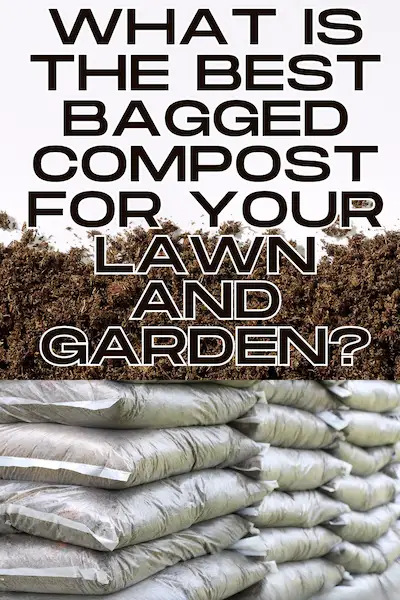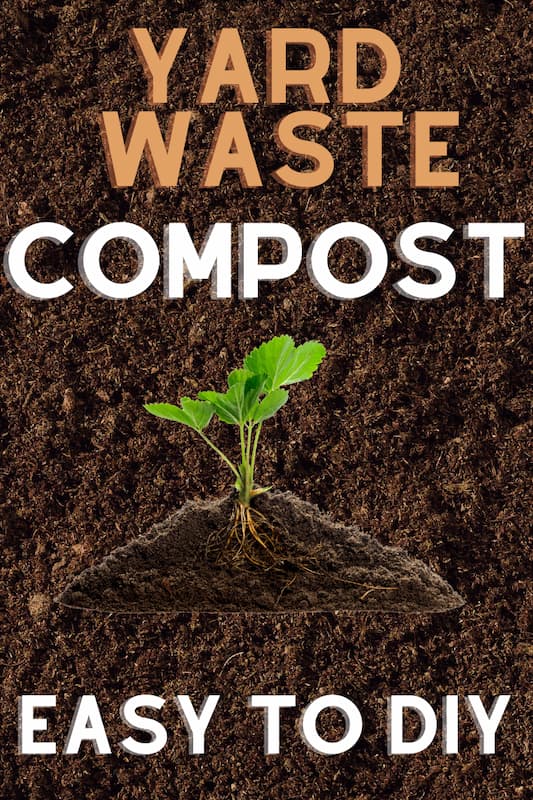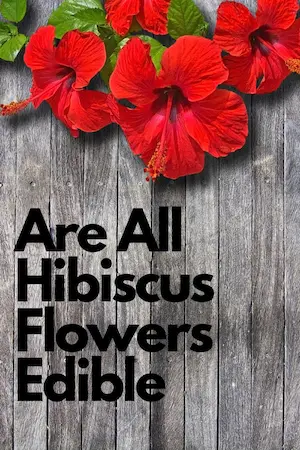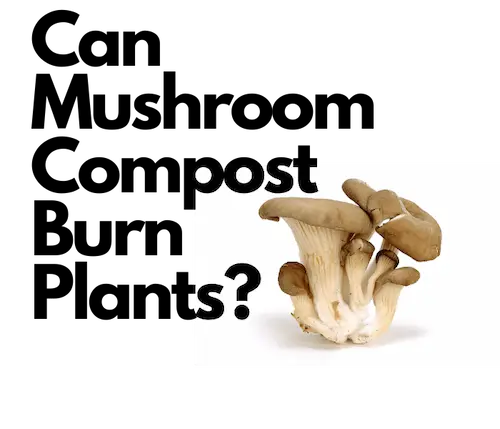Best Bagged Compost for Lawns and Gardens

What is the best bagged compost for your lawn and garden?
The quick answer is the best bagged compost for lawns and vegetable gardens is the one you make at home.. I’ll explain to you why this is the best option and show you how easy it is to make your own compost pile. There is not a high-quality, affordable commercially available bagged compost out there.
A quick search led me to these options, I have personally tried all of them:
EarthGro – Organic Humus and Manure – Does not State what type of Manure – Full of wood chips
Scotts – Humus and Manure – Probably made in same plant as the above
Black Kow – Composted Cow Manure is not as great as yard waste compost but is still ok, unfortunately this one often comes full of wood chips, mold, and other unwanted stuff (plastic??)
There used to be an EarthGro product called Steer Manure, that would have been ok, but you either can’t find it anymore or it is extremely expensive. I found an 8lb bag of decent looking compost for IF you STILL want to try to buy bagged compost then I can give you some decent options at the bottom.
What is compost, why is it the best soil amendment, a great fertilizer and plant booster?
Compost is the end product of decomposing organic plant matter. It is THE NUMBER ONE soil amendment to transform your native soil into a fertile growing medium, such that no other fertilizer should be needed. Think about it – you are taking what you didn’t consume from your lawn and garden (the leaves, grass blades, stems, roots, rinds, etc) and adding it back into the lawn and garden to be reused. Compost has all the nutrients needed for healthy plant growth and lawns in the most ideal, gentle delivery for the plants, it is basically nutrient rich soil. Compost helps add organic matter to sandy soils, helps moisture retention in clay soils and creates an overall healthy soil structure.
How does composting help sustainability?
Think about it in terms of sustainability – you are throwing away all the ingredients for perfect organic compost and then turning around and trying to buy it
-
Fall leaves, yard waste, garden waste, chemical free lawn clippings, kitchen waste – composting organic matter goldThis is all the perfect material to make perfect compost The best bagged compost for lawns is actually leaving the grass clippings in place – do not bag them, instead let them compost right in place and add that nitrogen right back into the soil where it is needed Compost is the best soil amendment and is much more environmentally friendly than chemical fertilizer Compost also adds beneficial bacteria and fungus to protect the plant roots from disease
Buying compost from the store doesn’t make sense for a lot of reasons:
-
The most practical reason – it is VERY hard to find high-quality compost on the shelfGood yard waste compost is expensive to make, package and ship in cubic feet bagsQuality Bulk compost can often be found in local nurseries – this requires expensive delivery or a pick up truck – but is an ok option rather than bagsStuff sold in the stores is composted manure, compost and humus – often times not ideal for your plants and lawns and full of wood chips and other fillersBig Box Store bought bagged compost can be “too hot” – meaning it has too many salts and too many nutrients – this can actually harm your plants in the long runStore bought compost can contain weed seeds that will set your lawn and garden back all season! The cost per cubic yard or cubic foot of good quality compost is higher than people want to pay in big box stores

How to easily make your own compost
-
Compost can be as hand off or involved as you like All organic material decomposes on its on in nature – a large pile of leaves will eventually become compost There are things we can do to make composting more efficient but simply piling up your fall leaves in a large pile will produce usable compost in about one year
Making composting more efficient:
-
We can speed up the decomposition of the leaves and also be able to add more variety of materials by keeping a few key things in mind
-
For the best results the pile should always be mostly brown dry carbon material (leaves are best)
-
The smaller the leaf matter the faster it breaks down, shred the leaves with a shredder or lawnmower before piling them up
-
Adding a smaller amount of green material (coffee grounds, food waste, green yard waste and chemical free lawn clippings) greatly speeds up the breakdown process
-
Mixing the pile to aerate it and adding some water for moisture greatly speeds up the breakdown process
-
If you do some of all of these tips you can have lawn and garden ready compost in under 3 months!

How to use the best compost for your lawn and garden:
The Secret to a Beautiful Lawn: Let the cut grass blades compost right in place on the lawn!
Like we stated above for your lawn the best bagged compost is the grass clippings that you didn’t bag up. Leave those clippings on the lawn, they break down very fast and provide nitrogen to the soil that you would otherwise be adding in chemical format. This habit, along with letting the grass grow to 3” before cutting it is all you need for a lush healthy lawn, if that is your thing. If your lawn has sandy soils and is in bad shape, good compost can be used as a top dressing. Sprinkle a thin layer of compost on the soil as an amendment to increase the organic content creating a healthy soil.
Compost, whether you bought bags, or read this article and made it yourself, is also the best mulch to place around your trees, bushes, shrubs and in your garden beds. It is also the best way to fill raised bed gardens and raised vegetable beds. Use a 50/50 mix of screened topsoil and high quality compost for the best combination of moisture retention and essential plant nutrients. You should also use compost as a side dressing during the growing season, it is the BEST gentle organic fertilizer.
NEVER use bagged wood mulch from the big box stores around any plant you like. These bags are full of terrible quality thrown away wood, chipped up and dyed with harsh chemicals. The piling up of it around your landscape harbors harmful fungus that is bad for you, your plants and the environment.
Now if you MUST buy compost and have ABSOLUTELY no way to make it, borrow it, find it yourself. There are a few good options:
-
Coast of Maine is a brand that makes compost as a by product of their farming operations, it is well balanced, consistent, and PRICEY as good quality compost should be
-
Composted Cow Manure is the gold standard for composted animal waste, the cows only eat greens and again makes a balanced, consistent, beneficial compost.
-
If you need a large amount of bulk compost, for starting new garden beds, for example, local nursery or garden centers bulk suppliers are best
-
Avoid Horse Manure, Pig Manure, “Compost and Humus” and mushroom soil – all of these will often do more harm than good
Even if you have a small garden, a balcony, or a giant farm, a small percentage of your growing space should be dedicated to repurposing the waste generated by creating your own compost!


Very insightful, thanks!